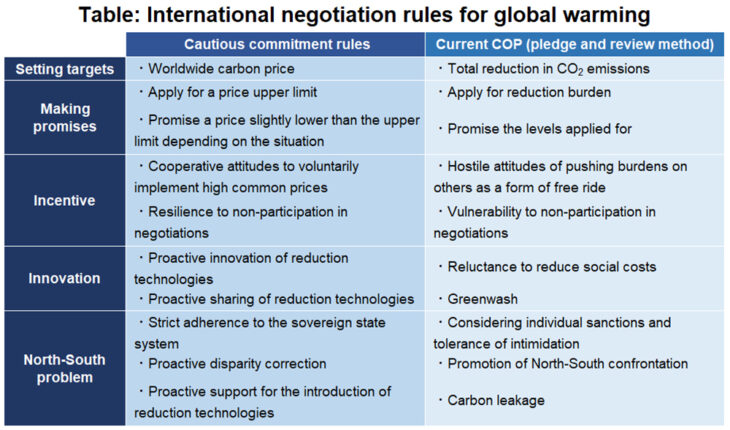A New Perspective on Global Warming Countermeasures: A Worldwide Carbon Price Target

“No one is excluded from using the atmosphere, but unlimited use leads to a decline in quality. Unplanned emissions of CO2 are a typical externality, causing a climate change (global warming) and causing harm in the world.”
Photo: yako/PIXTA
Matsushima Hitoshi, Professor, University of Tokyo
Key points
- Utilizing Uzawa Hirofumi’s “social common capital” concept
- Redesigning negotiation rules to guide active cooperation among countries
- Changing citizens’ attitude of wanting to avoid carbon taxes also necessary

Prof. Matsushima Hitoshi
The world has become interested in thinking about economic development in relation to the global environment and social issues. How can we lead affluent lives, develop excellent culture, and make a humanly attractive society sustainable? Humanity has begun to explore a shift change from capitalism to address this important issue.
As social responsibilities, commercial enterprises need to reduce the social costs of their own economic activities. Adding hazardous substances to food or discarding plastics causes negative externalities. This cannot be resolved unless the parties concerned eliminate the causes by themselves.
The role of government capable of enforcement is important in resolving externalities, with environmental tax being a case in point. However, the government has been slow to respond and cannot process enough information. Many externalities also span multiple countries and regions. We ought not expect too much from government enforcement.
Half a century ago, American economist Milton Friedman separated profit and charity, arguing that charity should be left to private donations while managers bear fiduciary responsibilities to maximize shareholder returns as employees of the shareholders. This had a strong impact and led to the misinterpretation of fiduciary responsibilities as stock price maximization. If a majority of shareholders support a company’s social activities, but some shareholders support another activity that maximizes stock prices, this would have been deemed to constitute an abuse of voting rights by the majority shareholders from a judicial standpoint.
Friedman’s claim that profit and charity can be separated is wrong and ignores externalities. The first to clearly articulate this problem was Uzawa Hirofumi (1928–2014), one of Japan’s leading economists.
Uzawa pointed out the enormous social costs that automobiles cause the natural environment and citizens’ lives and proposed the concept of “social common capital” to collectively refer to natural capital, social infrastructure, and institutional capital. Social common capital is almost synonymous with commons (shared resources), which are scarce resources for which users compete with each other while it is not possible to exclude users. If maintenance and management of these are neglected, any attractive society will lose its sustainability.
For example, no one is excluded from using the atmosphere, but unlimited use leads to a decline in quality. Unplanned emissions of CO2 are a typical externality, causing a climate change (global warming) and causing harm in the world. Uzawa argued that institutional design for social common capital is essential to making the humanly attractive society sustainable.
Notable activities related to social common capital include the United Nations’ Sustainable Development Goals (SDGs) and the Conference of the Parties (COP) to the United Nations Framework Convention on Climate Change. However, there are serious incentive problems and further institutional reforms are needed.
The SDGs are a movement to make people interested in the environment and society and to persuade them to reflect that in their economic activities. It aims to realize a sustainable society by taking advantage of market competition as people become ethically motivated. The SDGs are an approach that explores the potential of “new capitalism” in a unique way.
But appealing to citizens’ ethics is not enough. We must also explore alternative problem-solving approaches by incorporating non-market methods and still tolerate selfish motives.
COP focuses on reducing CO2 emissions and is an approach that explores the second regime (framework) that should be termed “new socialism.” COP is a committee for building consensus and implementing reduction targets and burden allocation through political negotiations rather than the market, but actual negotiations have been difficult. Because the UN is not a supranational governing body, it cannot enforce promises and implementation of burden even if there is a consensus about the targets.
There is also rampant imposition of burdens and searching for loopholes, including “carbon leakage,” which takes advantage of other countries’ CO2 reductions and moves production bases to other regions, and “greenwash,” which means environmental measures in name only. Uzawa pointed out this confusion from the outset, criticizing the scheme for greenhouse gas allowance trading within the Community of the 1997 Kyoto Conference (COP3) as adding to the confusion.
The negotiation rules of COP must be redesigned so that participating countries have an incentive to voluntarily cooperate in making reductions, on the premise that participating countries are selfish entities that give priority to themselves.
I have devised “cautious commitment rules” with the aim of defining globally a high level of carbon price (carbon tax rate) rather than reduction levels (see table).
Firstly, each country is required to apply for a domestic upper limit (permissible range) of the carbon price. If other countries apply for sufficiently upper limits, they will be made to promise the upper limit as it is. However, if there are other countries that apply for lower upper limits, the price may be slightly lower than the upper limit. As long as each country applies for a lower upper limit, they can avoid reduction burdens without being condemned. However, if the upper limit is lowered, the effective price of other countries will also be lowered according to the rules, thus eliminating the benefits of a free ride.
Moreover, intentionally continuing to not participate in negotiations and trying to induce rule changes so that only other countries achieve reductions will not succeed because other countries can patiently wait for re-participation while maintaining high prices.
Game theory has proven that these negotiation rules will give countries the incentive to stop free riding and aim to agree on and implement a high level of common carbon price together with others.
Another feature is that it is possible to strictly adhere to the “sovereign state system” (Westphalia system). A proposal has also been made for a method whereby developed countries alone determine the reduction burdens, including for developing countries, and impose that on developing countries (Climate Club). This is a method that tolerates developed countries to use individual sanctions and intimidation against developing countries, which makes it a dangerous proposal that could undermine national sovereignty and spark international conflicts.
By contrast, cautious commitment rules are an excellent social device that can sustainably maintain the global environment while protecting sovereignty without relying on sanctions or intimidation. With regard to the correction of North-South disparity, developed countries have incentives to actively support developing countries for the sake of promoting and disseminating innovations in reduction technologies.
Using the SDGs and COP as good examples, I have proposed a new capitalism based on the market and ethical motives, and a new socialism based on negotiations and sovereignty protection. In order for these to coexist in a single country or region, it is also necessary to devise ways to prevent citizens from seeing them as opposites.
Taxes, for example, are thought to be punitive, and this prejudice hinders international cooperation. When this new capitalism becomes widespread in a country, citizens of that country will be reluctant to pay more punitive carbon taxes because they are contributing to CO2 reductions through their economic activities. But since each country’s carbon price is determined by international cooperation, this reluctance disturbs the alignment with other countries and ultimately cripples the new socialism.
In order to avoid this, it is necessary to change the mindset of citizens so that they correctly recognize carbon taxes as “value commensurate with social common capital” rather than punishments. Rather than supporting the SDGs as an alternative to the often-abhorred introduction of carbon taxes, the government should develop a policy plan to promote both in parallel.
Translated by The Japan Journal, Ltd. The article first appeared in the “Keizai kyoshitsu” column of The Nikkei newspaper on 26 September 2022 under the title, “Ondanka taisaku ni aratana shiten: Sekaikyotsu no tansokakaku mokuhyo wo (A New Perspective on Global Warming Countermeasures: A Worldwide Carbon Price Target).” The Nikkei, 26 September 2022. (Courtesy of the author)
Keywords
- Matsushima Hitoshi
- University of Tokyo
- carbon taxes
- social responsibilities
- profit
- charity
- Milton Friedman
- Uzawa Hirofumi
- social common capital
- commons
- shared sources
- SDGs
- COP
- citizens’ ethics
- carbon leakage
- greenwash
- careful commitment rules
- CO2
- reduction levels
- common carbon price
- game theory
- new capitalism
- new socialism
